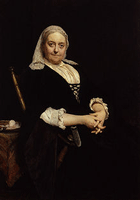Dinah Maria Mulock Craik Biography
Born Dinah Maria Mulock at Longfield Cottage, Hartshill, Stoke-upon-Trent in 1826. Her father was a Nonconformist clergyman. She wrote poetry from an early age and helped her mother teach in a small school.
In 1831 the family went to live at Newcastle under Lyme, Staffordshire where she attended Brampton House Academy. On inheriting some property in 1839, they all moved to London. Dinah continued to study a range of modern and classical languages. Her other interests included drawing and music.
Her first work to be published was a poem on the birth of the Princess Royal which appeared in the Staffordshire Advertiser in 1841. She wrote some stories for children and in 1849 The Ogilvies appeared. This novel was dedicated to her mother who had died four years earlier. Her career began to take off and she began to move in London literary circles. The head of the family (1852) was dedicated to Elizabeth Barrett Browning. Her best known work is John Halifax, Gentleman (1857) which features Longfield, named after the cottage in which she was born, and its publication led to a new prosperity. It was printed in many editions in English and in several foreign translations. Her own favourite novel was A life for a life (1859). In 1865 she married George Lillie Craik who was a partner in the company of Macmillan, publishers. Mrs. Craik lived with her husband at Shortlands, Bromley, Kent for the rest of her life.
Dinah was respected for her very generous and compassionate nature and this strength of character can be seen in the rather moralistic tone of much of her poetry, fiction and essays. She felt that true nobility was not dependent upon material wealth and this theme is well developed in John Halifax, gentleman.
THERE was a marriage-table where One sate,
Haply, unnoticed, till they craved His aid:
Thenceforward does it seem that He has made
...
"She loves with love that cannot tire:
And if, ah, woe! she loves alone,
Through passionate duty love flames higher,
As grass grows taller round a stone."
...
"PRAISE God from whom all blessings flow."
Praise Him who sendeth joy and woe.
The Lord who takes, -- the Lord who gives, --
O praise Him, all that dies, and lives.
...
WITH steady march across the daisy meadow,
And by the churchyard wall we go;
But leave behind, beneath the linden shadow,
...
A FRIEND stands at the door;
In either tight-closed hand
Hiding rich gifts, three hundred and three score:
...
